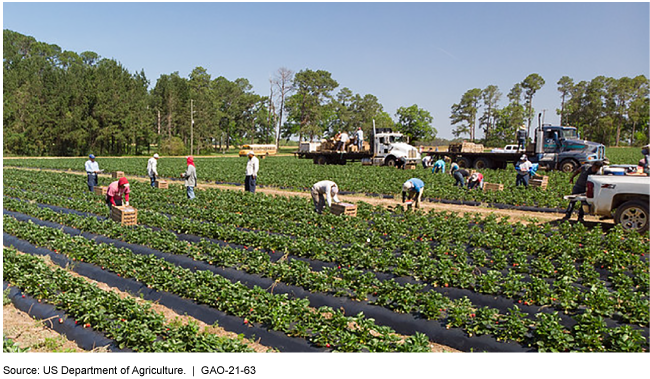Jan 18, 2021More info needed to protect workers from pesticide exposure, GAO says
Farmworkers exposed to agricultural pesticides need additional information on how to protect themselves, according to the Government Accountability Office.
According to a news release, since 2015, the Environmental Protection Agency (EPA) has had a Worker Protection Standard (WPS) for agriculture that permits farmworkers to identify someone who can request a farm’s pesticide information for their benefit.
In a new 34-page report to Congress, the Government Accountability Office (GAO) addresses how the so-called “designated representative” provision is being used or misused. The standard covers more than 2 million farmworkers at more than 600,000 farms, according to the EPA.
What GAO found
The U.S. Environmental Protection Agency (EPA) and states ensure compliance with the Agricultural Worker Protection Standard (WPS) primarily through inspections of farms. The states collect some information – such as the number of inspections they conduct – and provide that information to EPA as part of cooperative agreements between EPA and the states.
The extent of use of the designated representative provision of the WPS, and its effect on the availability of pesticide information, are not known because EPA does not collect information on the use of the provision and does not coordinate with states to do so. EPA’s guidance to states for conducting inspections encourages, but does not require, state inspectors to ask farmers and farmworkers about whether a designated representative has been used.
EPA officials said that the agency has not asked states to collect information on the provision because the agency has focused on compliance with other aspects of the WPS. By coordinating with states, through the cooperative agreements or some another mechanism, to collect information on the use of the designated representative provision, EPA would be better positioned to determine whether the provision is serving its intended purpose.
Some stakeholders have raised concerns about potential misuse of pesticide information, such as other farmers using the information obtained by a designated representative to gain a competitive advantage. However, EPA officials, state officials, and stakeholders told us they did not know of any instance in which a person serving as a designated representative misused the pesticide information obtained from farmers. Neither EPA’s guidance nor its website explain the agency’s expectations for appropriate use or describe how such information could be misused. EPA officials said that the agency has not explained what constitutes misuse.
By explaining, in the agency’s guidance, on its website, or through another mechanism, EPA’s expectations about appropriate use of pesticide information obtained by designated representatives, including the misuse of such information, the agency could ensure designated representatives understand the importance of the information in reducing the consequences of pesticide exposure.
Why GAO did this study
The use of pesticides contributes to U.S. agricultural productivity by protecting crops against pests or weeds, but this use may pose risks to human health. To reduce the consequences of pesticide exposure to farmworkers’ health, EPA revised the WPS in 2015 to include a provision that allows a farmworker to identify a person who can request, for their benefit, certain pesticide information from their employer – this is called the designated representative provision.
This report examines (1) what is known about the extent of use and effect of the designated representative provision on the availability of pesticide information and (2) what is known about any misuse of information obtained through the provision.
GAO reviewed laws, regulations, and guidance, and interviewed officials from EPA and 13 selected states about how they implement and oversee compliance with the standard. GAO also interviewed stakeholders, such as farmer groups and farmworker advocacy groups.
What GAO recommends
GAO is making two recommendations to EPA to (1) coordinate with states to collect information on the use of the designated representative provision and (2) take steps to explain, in guidance, on its website, or through another mechanism, the agency’s expectations about appropriate use of pesticide information obtained by a designated representative and describe potential misuse of such information. EPA agreed, in part, to both recommendations.
For more information, contact Steve D. Morris at (202) 512-3841 or [email protected].
– U.S Government Accountability Office















